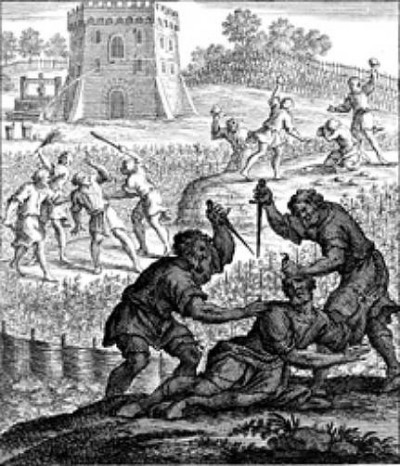We run our website the way we wished the whole internet worked: we provide high quality original content with no ads. We are funded solely by your direct support. Please consider supporting this project.

The Violent Vineyard Owner: A Response to Paul Copan (#8)
In my previous post I addressed two of the three parables that Paul Copan argues present God in violent ways. Today I will address the third, which is the parable of a vineyard owner with hostile tenants (Matthew 21:33-41; Luke 20:9-13). This parable differs from the previous two parables. Whereas the previous parables deal with personal responsibilities, this parable addresses the history of Israel’s resistance to God’s messengers, with the punchline being a prophetic warning of impending judgment.
The Point of This Parable. In this parable, a wealthy person planted a vineyard and hired farmers to take care of it when he moves away. When harvest time came, the vineyard owner sent three servants to collect the fruit, but the tenants beat one, killed another, and threw stones at the third. The owner dispatched a second larger company of servants, but the tenants abused them in a similar manner. Finally, “he sent his son to them,” but the tenants killed him, thinking they could in this way “take his inheritance.”
Thus far the parable has been descriptive of Israel’s treatment of God’s prophets and, in a proleptic mode, of their treatment of God’s Son. But the parable becomes oriented toward the future and turns prophetic as Jesus teaches that when the vineyard owner returns to his vineyard, he will “bring those wretches to a wretched end,” and, according to Luke, “kill them.” Most scholars consider this to be a reference to the impending destruction of the Jerusalem and the Temple that took place in 70AD, a judgment that Jesus refers to elsewhere (e.g. Lk 19: 41-44).
While the image of a vineyard owner dealing with tenants would be familiar to Jesus’ audience, the most surprising element of this atypical parable is that it depicts the tenants, whom Jesus’ audience would easily identify with, as acting absurdly cruel, while depicting the wealthy vineyard owner, whom Jesus’ audience would be inclined to think was “the bad guy,” as absurdly patient. And since the punchline of parables is most frequently found in their surprising elements, as I noted in the previous post, it seems apparent that this parable makes the behavior of the vineyard owner and the judgment of the rebellious tenants the punchline. This parable thus announces that God is going to bring a well-deserved judgment upon Israel for its history of rejecting and mistreating God’s messengers, which culminated in the crucifixion of God’s Son.
But does the fact that this parable announces a coming judgment of God also entail that Jesus intended this parable to teach anything about how God will bring about this judgment? As I said in my previous post, there is an “is” and “is not” quality to all parables, and the question I’m raising is this: Is this parable’s depiction of the vineyard owner killing the tenants part of this parables “is” or “is not” quality? There are three considerations that lead me to conclude that this depiction is part of this parable’s “is not” quality.
Three Considerations. First, consider the way God in fact brought about this judgment in 70AD. It was a brutally violent judgment, but none of the violence was brought about by God. This much is clear in Jesus prophesy when he says to the inhabitants of Jerusalem,
… the days will come upon you, when your enemies will set up ramparts around you and surround you, and hem you in on every side. They will crush you to the ground, you and your children within you, and they will not leave within you one stone upon another; because you did not recognize the time of your visitation from God (Lk 19:43-44).
Note that the violence involved in this judgment was carried out by “your enemies,” referring to the Roman army. “They will crush you to the ground,” Jesus says, and “they will not leave within you one stone upon another.” Yes, this was a judgment of God, but as it turns out, God didn’t kill anyone!
A second reason for concluding that the violence of the vineyard owner in Jesus’ parable was part of its “is not” quality is that Luke notes that as Jesus gave this prophesy about the impending judgment on Jerusalem, he was weeping, or even wailing (klaiō) (Lk 19:41). Since Jesus is the exact representation of God’s very essence (Heb 1:3), we must consider Jesus’ wailing to reflect God’s heart whenever he sees he must turn people over to experience the consequences of their sin.
Yet, this is altogether absent in Jesus’ parable about the vineyard owner. Indeed, this parable arguably assumes that the vineyard owner returns to kill the tenants in anger and in order to retaliate for the death of his son and his servants. It’s of course perfectly understandable that Jesus would depict this vineyard owner violently punishing the tenants, since this is how powerful people typically punished rebels under their authority. The only thing that Jesus’ audience would have found surprising is that the vineyard owner put up with so much before deciding to finally carry out this judgment.
Not only is Jesus’ violent imagery understandable, but it’s not clear how Jesus could have incorporated into this parable the truth about God’s wailing heart in bringing about judgments, let alone God’s non-violent way of bringing about judgments. It runs counter to the imagery Jesus is using in this parable as well as counter to the central point Jesus is making with this parable. In any event, we clearly should not try to infer anything about the way God judges from the way this tenant punished his rebellious tenants.
Finally, and most importantly, on the cross Jesus stood in our place and bore God’s judgment of the sin of the world. This judgment certainly involved horrific violence, but as was true of the judgment of Jerusalem, God was not the agent who brought this violence about. The only action God took in bringing about this judgment was to “deliver Jesus over” to wicked humans operating under the influence of wicked powers (Rom 4:25; cf. 8:32), and it was they who violently afflicted Jesus.
Since all our knowledge of God should be anchored in the crucified Christ, “in whom are hid all the treasures of wisdom and knowledge” (Col 2:3), this should be our paradigm for how God always brings about judgment. And as I demonstrate in CWG (805-890), there is a wealth of Scripture that confirms this truth. As Paul teaches in Romans 1, “the wrath of God is revealed from heaven against all ungodliness” when God gives people over to suffer the destructive consequences that are inherent in their sin (vv.18, 24, 26, 28).
Together with the previous two considerations, this teaching requires us to interpret the violence of the vineyard owner to be part of the “is not” quality of this parable. And as such, it constitutes no objection to my claim that the God revealed in the crucified Christ is altogether loving and free of violence.
Category: General
Tags: Cruciform Theology, Judgment, Non-Violence, Parables, Paul Copan, Violence
Topics: Interpreting Violent Pictures and Troubling Behaviors
Verse: Luke 20, Matthew 21
Related Reading

Anabaptist Response to the Attacks in Paris and Beirut
https://youtube.com/watch?v=paUtIl-oRpM&feature=youtu.be Our friend Bruxy Cavey, the pastor at The Meeting House in Toronto shares some thoughts on how to respond to the violence that is going on in the world. He writes: The Meeting House is a Historic Peace Church. In responding to terrorism, we don’t presume to tell governments what they should do, for…

Non-Violence and Police Protection
Scott Davidson via Compfight Question: I am a President of a State University. As a frequent podcaster of your sermons and reader of your books, I’m seeking your advice on a matter. Because our campus is some distance from the police headquarters in our city, many within the State University are arguing that we should…

Lighten Up: Jesus Makes Things Hard
Maybe Mark Driscoll is on to something. I guess Jesus really does want to make someone bleed. ;)

Sermon 7/22/12: The Shadow of the Cross
In his sermon this past Sunday, Greg continued his fleshing out thoughts from the previous week on how he reconciles the violent, disturbing portraits of God in the Old Testament with the revelation of God in Jesus Christ on the Cross. He answers a question raised by several in response to last week’s sermon: Did God actually engage…

Sermons: The Church – Week Five
In week five of this sermon series, Greg Boyd discusses what the church should look like in the lens of the cross. A universal Church was born out of the ministry of Jesus, and this Church is empowered to look like the Cross. In this sermon, Greg shows us why it’s so important, as the…

Is Spanking Okay?
Given Greg’s stance on non-violence, I thought it would be interesting to know his thoughts on spanking. Proverbs 13:24 “Whoever spares the rod hates their children, but the one who loves their children is careful to discipline them.” Links: http://traffic.libsyn.com/askgregboyd/Episode_0008.mp3
